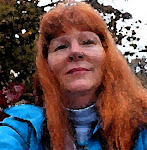I am heavier then most
My hair is not perfect
My skin is blemished.
The boys call me
To complain about the others
I listen
I answer
I laugh at their silly ways.
They look through me.
One day they’ll call me
Just to talk to me.
And I will know it’s because
Of who I am inside.
I’ll listen
I’ll answer
We’ll laugh at their silly ways.
He sees into me.
One day, they’ll see
That under my skin I am gorgeous.
They will be sorry they undervalued
What I can do.
But I won’t need them; I never did need them.
I, too, am Woman.
___________________
I used Langston Hughes’ poem "I, Too" as a starting point for my poem. His poem is about how black people are oppressed and shunned. They are ignored and considered a lesser being, but others do not realize what they, specifically Hughes, are capable of. Hughes does plan to show them what he can be – that he has the potential to be something great and that he will rise up against the oppression. Hughes is proud of who he is and considers himself an important part of America. One day, people will be ashamed of how they treated him and they will appreciate him for all his worth.
In the year 2007, although most people do not make judgements based on skin color, they still judge people on the way they look – if someone is not as aesthetically pleasing as others, they are often judged and become outcasts. I know that most people have felt less then beautiful at some time in their lives, including myself. People who are outcasts because of their looks are oppressed in sort of the same way as African-Americans were during slavery or in the South under the Jim Crow laws, when Hughes wrote this. The less beautiful are kept apart from those that are considered to be better looking, just like black people were separated from others. These separations have nothing to do with who is better, smarter, or earned the right to be considered accepted. Instead the separations are based on shallow notions that what a person looks like on the outside defines who they are on the inside.
It is important that people do look past the exterior and get to know someone because they could be truly great on the inside. My poem is based on the idea that all women are beautiful, not just the ones who are obviously so. It also stems from the idea that the only way some one can be completely happy is to see past looks and get to know someone and appreciate him or her for it. Relationships that are based on looks become as shallow as the reason for starting it. On the other hand, relationships based on love and appreciation of the other person tend to give the most pleasure to both parties involved. This is similar to the relationship between white and black people in the South. Because they were not working together, the people of the South did not reach their full potential. Instead, there was always fighting and people dying senselessly.
The woman in the poem finds someone who gets to know her and love her for who she is despite her weight, skin, and hair, or maybe even because of them. She thinks maybe one day other women will see how great she is, but she will not need them as friends. She realizes she has never needed anyone who is shallow. She knows that their shallowness prevents them from reaching full happiness and she laughs at them for it.
Like Langston Hughes considered himself an important and overlooked part of America, the woman in the poem is not appreciated because of her looks. Both poems recognize the potential of the oppressed and how great things could be if people saw them for who they are.
___________________________
LIT203 African-American Literature, Spring 2007
Published with permission


No comments:
Post a Comment